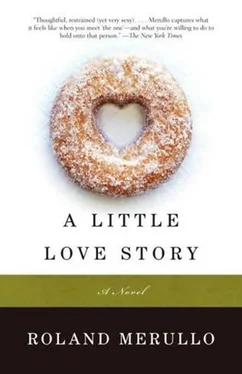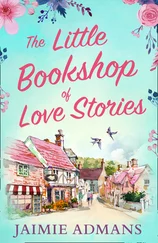I said how nice the gardens looked, with the trees so bright, and the more muted colors in the flower beds. I pretended I wanted to sit on one of the benches there and watch kids feed the ducks.
“I hate this,” she said when we sat down and she caught her breath. A hard little wind blew her hair up around her face. She was quiet for a minute, then, softly, almost as if she were talking to herself, “Being dead, I think I can deal with. Being alive and not able to do things, not be able to walk, for God’s sake…”
I put my hand on the top of her leg. In a minute she turned her face away, and started crying. I took my hand from her leg and put it around her shoulders, and pulled her against me.
“Some days I want to scream. I want to stand out in the middle of the street and look up at the sky and just scream and smash things. I want to ride a horse or jog on a beach or go bowling. Anything. I used to be so physical. I played field hockey at school. I loved to swim, to skate. Everything I tried, I loved-hiking, cross-country skiing.” She stopped. She swiped at her right eye with the bottom of her palm. She took a breath and blew it out. We stared at the Public Garden for a long while and then she said, “Alright. I’m finished with that.”
“All you do is complain.”
“Right,” she said. “I’m sorry. Do you want children, really?”
I heard the bending note again.
“Most of the time. You?”
“I’d have eight if I were strong enough. I’d fill a huge house with them. I have dreams about having children. Two or three times a week now I have a dream like that.”
“Are you sure you can’t?”
She turned her face away.
Not far in front of us, in the direction Janet had been looking when she asked the question about children, a little towheaded boy and a little towheaded girl were throwing something into the pond. Potato chips, it looked like, tossed up and wobbling in the breeze. The ducks weren’t interested in that particular brand of potato chips, and the girl was getting more and more upset about it and trying to stamp both her feet at once and yelling in a lispy, weepy, aggravated voice: “Duckies! Duck-IES!” The boy seemed to think the problem was that he wasn’t throwing the chips out far enough, so he’d rear back and fling them mightily and then stand with his fists at his sides as the ducks made their quick turns back toward the middle of the pond. There were adults, alone and in pairs, sitting nearby on the other benches, and on the grassy bank, but whoever the parents were, they were of the school of parenting that said, Let your kids play right on the edge of a dirty pond deep enough for them to drown in and let them get really frustrated there and don’t say anything to them or do anything about it.
After a few minutes an older woman walked over to them. She reminded me of my mother, the same erect posture and sure-ness about her. The boy and girl didn’t seem to know her, but the woman gave each of them a slice of white bread, and showed them how to tear up the bread into pieces. When the ducks saw this turn of events, they came gliding toward the towheaded twins, a white fleet of expectation, and the girl started jumping up and down again, her shoes lifting all of an inch into the air. Duckies! Duckies!
Janet and I were both watching. For some reason the little drama made me think of something I had seen in Mexico, years before. I had sold a painting-my first-and to celebrate, Giselle and I had flown to Puerto Vallarta on a whim. We didn’t even make hotel reservations, just took a taxi from the airport into town, asked around with our high-school Spanish, and found a very clean casa de huespedes with pastel-colored tile floors three blocks from the beach. We stayed ten days. In the mornings I would get up early and go for a run before the sun had come up over the mountains. Then I’d go back and shower and we’d walk to a breakfast place we liked, where there weren’t any other tourists. One morning we were sitting there with our huevos rancheros and café con leche and a small skinny boy walked in and began going from table to table with his hand out. The boy was six or seven. He had sores on his face and arms, and a threadbare T-shirt. We gave him what amounted to three dollars or so and he managed to get to one more table before the owner came and roughly ushered him out. At the next table, behind Giselle’s back and directly in my line of vision, sat a man in a fine gray silk suit and a white shirt open at the collar-I will always remember this man-and when the boy had been chased out unceremoniously into the happy seaside morning, this man started doing strange things with his food. He took one of the fresh breakfast rolls that eggs were served with in that place and he opened it down the middle with his thumbs. He picked up the juicy browned slice of ham with his fork and folded it into the roll, then he lay a piece of avocado in there, then some fried egg. I watched him over Giselle’s right shoulder. The owner watched him, too. The man worked with a surgeon’s grace, with careful movements, without dropping any food on the material of his expensive suit. When he was finished he wrapped the sandwich carefully in two napkins, stood up, and hurried out the door, and I watched him trotting down the sidewalk in the same direction the boy had gone. In a few minutes he came back and finished what was left of his breakfast.
N o v e m b e r
BY EARLY NOVEMBER in Boston the trees have lost most of their leaves. On wet days the branches and trunks are black and slick-looking. In the afternoons a damp hard wind blows off the harbor, and then darkness swells up out of the tar streets, and the traffic lights shine like jewels. It is not winter but no longer truly fall, and the tourists are gone, and the city is stripped down to a tight rhythm of moneymaking: the mouths of subways suck in clots of workers and breathe them out again across town; the streets are full of taxis and delivery trucks and touched with a kind of coldness and sadness I have always secretly liked.
I like it right through Thanksgiving, and the first snow, and Christmas, and then, near the middle of January, I begin to hate it. The days will never be warm again, I’ll never wear a T-shirt and running shorts again, or see women walking down Massachusetts Avenue with their legs bare and happiness on their faces. There is ice on the river, or the water is purple and raw. Why would anyone want to live here?
But November is fine. Smart carpenters have gotten their outside work finished by then-Gerard and I learned that the hard way one year-so, by Election Day, we had Jacqueline’s addition closed in and clapboarded.
Once we had the outside work done, we cut open the tight pink rolls of fiberglass insulation and stapled them into the stud bays, a miserable job that makes your wrists and neck itch for hours afterwards. On top of the insulation we stapled sheets of clear plastic, to keep the water vapor that’s inside the house from penetrating the walls and making the insulation damp and ineffective. And when that was done we began to put up the wall-board-Sheetrock, it’s usually called.
Hanging “rock” is not a particularly enjoyable job. The board itself is made of pressed gypsum, heavy and awkward, and the cuts and joints have to be done just right. Most carpenters used screws and drills by then, but I have a crazy need to do some things the out-of-date way, so Gerard and I used hammer and nail. The trick to nailing up Sheetrock is to press the board tight against the studs with one hand and hit each nail hard enough so that you make a “dimple,” but not so hard that you cut through the gray paper that holds the pressed gypsum in place. Later, you fill the dimple with joint compound and sand it smooth, and if you do it right, when the wall is painted, the nail and the dimple don’t show. The best old carpenters have a feel for it, and, high or low, swing so that the business end of the hammer strikes the wallboard flat-on.
Читать дальше












